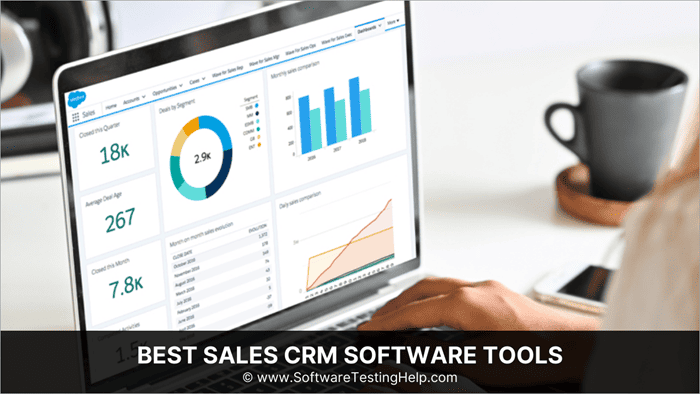Sales CRM software is revolutionizing how businesses manage their relationships with customers, making it an essential tool in today’s competitive market.
This software not only streamlines sales processes but also enhances communication and collaboration within teams, ultimately driving higher productivity and customer satisfaction. With a plethora of options available, understanding the unique features and benefits of sales CRM software can significantly impact your business outcomes.
Overview of Sales CRM Software
Sales CRM software is a vital tool that helps businesses manage their interactions with current and potential customers. It streamlines processes, automates tasks, and organizes customer information in one central location, making it easier for sales teams to enhance their productivity and improve customer relationships. The primary functions of sales CRM software typically include managing contacts, tracking sales leads, monitoring customer interactions, and generating reports to analyze sales performance.
Key components of a sales CRM system encompass contact management, sales automation, lead management, reporting and analytics, and integration capabilities with other tools. Popular sales CRM software options in the market include Salesforce, HubSpot, Zoho CRM, and Microsoft Dynamics 365, each offering unique features tailored to various types of businesses.
Benefits of Using Sales CRM Software

Implementing sales CRM software brings numerous advantages for businesses. Firstly, it enhances customer relationships by providing sales teams with timely access to relevant customer data, allowing for personalized interactions. Additionally, sales CRM software can significantly improve sales team productivity by automating routine tasks, enabling team members to focus on selling rather than administrative work.
The advantages of utilizing sales CRM software extend beyond efficiency; they foster better collaboration among team members by providing a shared platform for tracking customer interactions. Businesses that adopt sales CRM software often experience increased sales conversions and an overall boost in revenue.
Features to Look for in Sales CRM Software
When selecting a sales CRM software, it’s essential to consider several key features that will support the specific needs of your business. These features include:
- Contact Management: Efficiently store and manage customer information.
- Sales Automation: Automate repetitive tasks to increase sales efficiency.
- Lead Management: Track and nurture sales leads through the sales funnel.
- Reporting and Analytics: Generate insights to inform sales strategies.
- Integration Capabilities: Ensure compatibility with existing tools and systems.
- Customization Options: Tailor the CRM to meet unique business requirements.
The functionalities of different sales CRM software options can vary significantly, making it crucial to evaluate them based on the specific requirements of your organization. Customization options are particularly important as they allow businesses to adapt the software to their unique workflows and processes.
Implementing Sales CRM Software

Successfully implementing sales CRM software in a business requires careful planning and execution. Key steps include defining clear objectives, involving stakeholders from the beginning, and selecting the right software that aligns with business needs.
During the implementation process, common challenges may arise, such as resistance to change among employees or data migration issues. Addressing these challenges involves effective communication, robust training programs, and providing ongoing support to users. Best practices for training employees include hands-on workshops, e-learning modules, and continuous feedback to ensure all users can effectively navigate the CRM system.
Measuring the Success of Sales CRM Software
To evaluate the effectiveness of sales CRM software, businesses can utilize various metrics. Key performance indicators (KPIs) such as sales conversion rates, customer retention rates, and average deal size can provide insights into how well the CRM is serving its purpose.
Analyzing sales data generated from CRM software involves examining trends in customer behavior, tracking sales performance over time, and identifying areas for improvement. Gathering feedback from users through surveys and regular check-ins can also help assess the CRM’s performance and uncover potential issues.
Trends in Sales CRM Software
Current trends shaping the future of sales CRM software include increased reliance on artificial intelligence (AI) and machine learning technologies. These advancements enable predictive analytics, automating data entry, and providing personalized recommendations that enhance user experience.
Mobile accessibility and cloud-based solutions are also becoming increasingly important, allowing sales teams to access CRM systems from anywhere, improving flexibility and responsiveness. As businesses continue to adapt to remote and hybrid work environments, these trends are likely to play a critical role in the evolution of sales CRM software.
Case Studies of Successful Sales CRM Implementation, Sales CRM software

Real-world examples illustrate the tangible benefits of sales CRM software. For instance, a mid-sized tech company implemented Salesforce to streamline their sales processes, resulting in a 30% increase in sales within the first quarter. By focusing on lead management and sales automation, they maximized their CRM’s effectiveness.
Strategies employed by businesses to optimize CRM software often include regular training sessions, establishing clear processes for data entry, and fostering a culture of collaboration among sales teams. Insights from these case studies reveal that a well-implemented CRM system can transform a company’s sales strategy and significantly enhance overall performance.
Conclusive Thoughts
In conclusion, leveraging sales CRM software can transform the way your organization interacts with customers and manages sales operations. By embracing these technologies, businesses not only improve efficiency but also foster stronger customer relationships, paving the way for sustainable growth and success.
